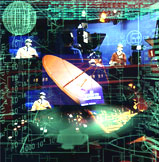  |
Live and on-demand Webcast provided by the UN Webcast |
|
|
Programme
|
| |
|
|
Wednesday 16 November |
|
|
| 10:00– 11:00 |
WSIS Official Opening |
| |
 |
|
11:00 – 13:00 |
Session 5  Archived Video: [English] [Original language] Archived Video: [English] [Original language]
Saving the world's audiovisual archives for the 21st century and beyond |
|
|
| |
Many cultural treasures are rotting on film and tape in the basements of broadcasters around the globe. New technologies could save these riches for future generations, but can the world be persuaded to find the resources required? This session will be organised in collaboration with the International Federation of Television Archives (FIAT/IFTA).
|
|
|
| |
|
|
13:00 – 14:00
|
Sandwich lunch offered by ASBU
|
|
|
| |
 |
|
14:00 – 16:00 |
Session 6  Archived Video: [English] [Original language] Archived Video: [English] [Original language]
Cultural diversity and dialogue of civilisations in the information society |
|
|
| |
The new technologies have made the richness and diversity of the world's cultures more visible and accessible than ever before. But do all the societies have the capacity to take advantage of these developments? Do these new technologies also encourage cultural homogenization, or the prevalence of some cultures to the detriment of others? How can new and traditional media enhance the diversity, representation and understanding of different cultures? Panellists will explore the different cultural functions of global, regional, public service, community and private media.
|
|
|
| |
 |
|
16:15 – 17:45 |
Session 7  Archived Video: [English] [Original language] Archived Video: [English] [Original language]
Safety of journalists in zones of conflict |
|
|
| |
The first years of the information era have been the most deadly for journalists. Politicians, journalists and international officials debate what measures could be taken to protect the key providers of content in the information age.
|
|
|
| |
 |
|
18:00– 19:00 |
Session 8  Archived Video: [English] [Original language] Archived Video: [English] [Original language]
Concluding session
WEMF messages for the WSIS |
|
|
| |
Key participants in all preceding sessions draw together their message for delivery by United Nations Secretary General Kofi Annan to the WSIS.
|
|
|
| |
|
|
Tuesday 15 November |
|
|
| |
 |
|
09:00 – 10:00 |
Session 1  Archived Video: [English] [Original language] Archived Video: [English] [Original language]
Introduction: the WSIS and broadcasters |
|
|
| |
Why was the World Summit on the Information Society (WSIS) convened, and what was achieved? A review of the intentions and objectives of the WSIS, and the role of broadcasters in the information society.
|
|
|
| |
 |
|
10:30 – 12:30 |
Session 2  Archived Video: [English] [Original language] Archived Video: [English] [Original language]
Achieving the Millennium Development Goals – the role of broadcasters and the new technologies
|
|
|
| |
The combination of traditional and new media can play a vital role in giving voice to the concerns, hopes and dreams of the poor and marginalised. How can broadcast media help the citizens of developing countries improve their conditions? How can broadcasters harness new information and communications technologies to help attain the fairer and less unequal world envisaged by the Millennium Development Goals?
|
|
|
| |
|
|
12:30 – 14:00
|
Lunch
|
|
|
| |
 |
|
14:00 – 15:45 |
Session 3  Archived Video: [English] [Original language] Archived Video: [English] [Original language]
Using ICTs in the Broadcast World
|
|
|
| |
What areas of the programme making and media delivery activity can benefit from information and communication technologies (ICTs)? New technologies can improve productivity, but is it always necessarily more efficient to use IT rather than the more staff intensive methods?
|
|
|
| |
 |
|
16:15 – 18:00 |
Session 4  Archived Video: [English] [Original language] Archived Video: [English] [Original language]
The interconnection between broadcast technology and content – is the medium or the content the message? |
|
|
| |
Some media sociologists argue that - while watching and listening to specific programmes is the reason we buy and use media technology, and that what we see and hear strongly influences our lives - society is changed by technology rather than content. If we can understand the forces that shape our world, this will help us create a better society. The session will consider the shaping factors of the information society.
|
|
|
| |
|
|
|
|
|
|
|